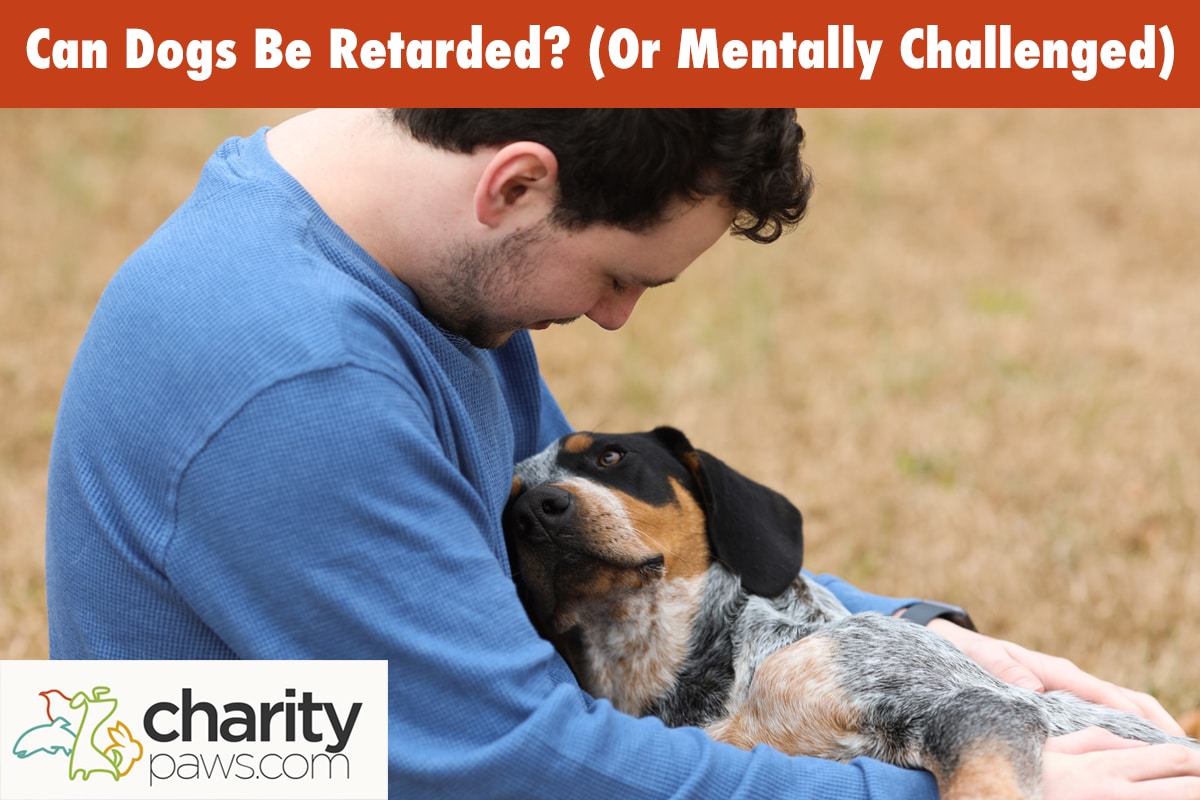As the years go on, there is more understanding of the mental handicaps and mental illnesses that humans can face.
Though we all know that people can be mentally challenged in a variety of ways, many wonder if their canine companions can as well.
So can dogs be retarded or mentally challenged?
In this article we will discuss the mental disorders that are commonly seen in our canine friends, and help you better understand what this means for their life going forward.

Can Dogs Be Mentally Challenged?
Unfortunately, our dogs are not immune to mental handicaps.
Dogs can be mentally challenged in their own ways, though most of their complications are related to mental disorders and behavioral struggles.
The brain is an organ just like any other, making it just as prone to developmental complications and illnesses.
Our dogs may not be at risk of the same mental challenges that humans are, but they certainly can have canine versions.
Can Dogs Be Born Mentally Challenged?
There are certain mental handicaps that dogs can be born with.
This is often as a result of developmental complications as their bodies grow in the womb, as well as being passed down from dog to dog.
This is thankfully very rare, but it can occur in some unlucky pups.
Whatever the case, some dogs will be born mentally challenged.
What Are The Common Mental Disorders In Dogs?
Now that you are aware of the fact that dogs can struggle with mental challenges, it’s time to discuss some of the most common mental disorders seen in our canine friends.
Ranging from mental illnesses to hereditary disease, these conditions can deeply impact a dog’s daily life.
Canine Anxiety
Many canine friends will suffer with crippling anxiety that not only impacts their daily life, but their owners as well.
Canine anxiety can come in many forms, with their mental disorder surrounding everything from separation to loud noises.
Separation anxiety is typically the most impactful form of canine anxiety, as owners find it challenging to be away from their pup for any period of time.
A dog with anxiety may experience:
- Excessive vocalization
- Whining
- Panting
- Trembling
- Self harm (excessive licking and chewing of the skin)
- Destructive behavior
- Digging
- Inappropriate urination and defecation around your home
These symptoms are typically present during the distressing moment for the dog, but some cases of anxiety can bleed into every moment of a dog’s life.
Thankfully, many cases of canine anxiety can be treated, or at least managed in our furry friends.
Some of the most effective treatment methods involve behavioral training and desensitizing their triggers, but some dogs may require medication to minimize their symptoms.
If you are unable to manage your dog’s anxiety through behavioral training, it may be time to seek medical intervention.
Post Traumatic Stress Disorder (PTSD)
Many of us are aware that humans can suffer from the devastating impacts of PTSD, but you may be surprised to learn that our dogs can too.
Dogs can have traumatic events or periods of their life that stick with them, making it challenging to maneuver through life to this day.
These traumatic events can include everything from previous abuse to attacks from dogs, causing an ingrained fear that needs to be managed.
Be aware that some rescue dogs may have PTSD that they will need to work through.
Dogs with PTSD often display symptoms of their condition when they feel as if they are in a similar setting to where their trauma occurred.
These dogs are typically triggered for whatever reason, causing them to become reactive.
These dogs may experience:
- Trembling
- Whining
- Barking
- Aggression
- Snapping
- Inappropriate urination and defecation
Treatment for dogs with PTSD can be complex, but many can find recovery with dedicated owners.
Most dogs will find relief once their owners focus on exposing them to potential triggers in a controlled setting, allowing them to build their confidence and create new memories in these situations.
If your dog is really struggling to move forward from a traumatic event, medication can be an option.
Canine Depression
Many dogs will experience depression when they endure a drastic life change.
Dogs become extremely bonded to those in their life, as well as attached to their daily routine and structure.
If any of these aspects undergo a sudden change, some dogs can fall into a depression.
Depression in dogs can occur due to the loss of an owner, the loss of another pet in the home, a move to a new environment, a new animal in the home, and even a new medical diagnosis for them.
Each of these possibilities can cause a huge shift in their daily routine.
Dogs with depression may experience:
- Disinterest in activities they once enjoyed
- A decreased appetite
- Changes in sleep schedule
- Low activity levels
- Hiding away
Canine depression can vary in lengths for each pup, with some bouts of depression lasting months in dogs.
Depression in dogs can be resolved with time and plenty of TLC.
Depressed dogs need their owner’s support in encouraging them to eat, getting up to go on daily walks, and participating in things they once enjoyed.
As life begins to settle into the new normal, many dogs will slowly come out of their depression.
Compulsive Disorders
Similar to OCD in humans, dogs can suffer from their own form of compulsive disorder.
These conditions can be hard for us to understand, as there is no way for us to know what is going on in our dog’s head.
The only thing we witness is the debilitating symptoms these dogs experience, many of which can be very concerning.
Dogs with a compulsive disorder may experience:
- Compulsive licking of their skin
- Flank sucking
- Constant pacing
- Circling
- Tail chasing
- Licking or chewing on objects
- Excessive drinking
- Freezing and staring into the distance
Dogs that develop a compulsion will need to be seen by a veterinarian for treatment.
Behavioral therapy can’t help these pups, as these compulsions are not tied to any behavioral struggles or learned behavior.
Many of these dogs will require daily medication to help them through their mental disorder.
Cerebellar Hypoplasia
Unlike the conditions listed above, cerebellar hypoplasia is not considered a mental disorder in dogs, but rather a motor disorder.
CH in dogs refers to the inadequate development of the canine cerebellum, leading to an array of complicated struggles with movement.
This is often a hereditary condition passed down from dog to dog, but there is not always a known cause.
Dogs with CH will often struggle with coordination and balance.
These pups may appear unsteady on their feet, they may fall often, and they may have a strange gait.
Some of these dogs appear to prance as they walk, as they don’t seem to have an understanding of where to place their paws.
CH can vary in severity, so while some dogs will lead full lives with minimal struggles, others will face difficulty each day.
There is no treatment available for cerebellar hypoplasia in dogs, but many dogs will improve as they grow older.
Dogs will learn to compensate with their condition and the motor difficulties it causes, allowing them to work around these struggles eventually.
Many of these dogs will have symptoms for the rest of their lives, but they will learn how to live with their condition with the right support.
These pups require dedicated owners, as they will need more support than the average pup.
Can Dogs Be Autistic?
This is a challenging question to answer, as it is still highly debated in the veterinary space.
With autism being a complicated condition that impacts the way a human views and interacts with the world around them, many wonder if our dogs can struggle with it as well.
Autism also has a vast spectrum and impacts everyone in a different way, so it is difficult to compare to our canine friends.
However, scientists have been noting autism-like behaviors in dogs since the 1960’s.
Autism often leads to the impaired ability to interact with others and participate in daily life, and many believe our dogs can experience these complications in some form.
Though research is still ongoing and we cannot yet diagnose autism in dogs, there is reason to believe that it may be an option one day.
Due to the fact that autism-like behaviors will have a spectrum, this means that scientists have been studying varying degrees of behavioral struggles in dogs.
Most of these symptoms revolve around general behavior and interaction with other dogs, as well as their participation in daily habits.
Some of the potential behavioral challenges in dogs include:
- Impaired interaction with other dogs
- Impaired interaction with humans
- Behavioral issues that will not resolve despite training and behavioral therapy
- Not being responsive to calls for attention
- Becoming easily overwhelmed with noises, stimulation, and more
- Inability to concentrate on tasks or toys
- Not being interested in normal dog behavior such as playing with owners, playing with toys, etc.
These behavioral struggles can be a result of other mental disorders in dogs, so we always suggest speaking with your vet before assuming your dog struggles with an autism-like condition.
How Do I Know If My Dog Is Retarded Or Mentally Challenged?
Our dogs cannot explain their daily struggles, so it’s up to us to determine whether or not they have more mental obstacles than the average pup.
The best way to do this is by observing your dog’s behaviors over an extended period of time, and sharing these findings with your veterinarian.
By comparing their current actions to their previous behavior, or even the behavior of other dogs, you can better gauge what is abnormal for your furry friend.
You and your veterinarian can discuss these behavioral struggles in detail and hopefully determine what could be causing your dog distress.
Another way to know if your dog is mentally challenged is by recording any strange behaviors.
For example, if your dog is constantly chasing their tail to the point of exhaustion, we suggest recording these episodes and showing your vet.
This can help them diagnose a behavioral disorder in some cases, so it is always worth a shot.

Final Thoughts On Dogs Being Mentally Challenged
Our dogs can’t express their daily struggles and emotions, so it can be challenging to determine whether or not they are battling a mental disorder.
The best way to know if your dog is mentally challenged is by observing their daily behaviors over a period of time, and sharing this information with your vet.
With this information in mind, they can help you determine what your dog may be struggling with.

